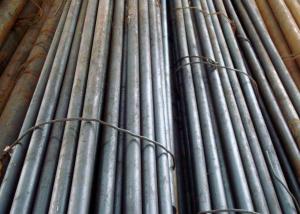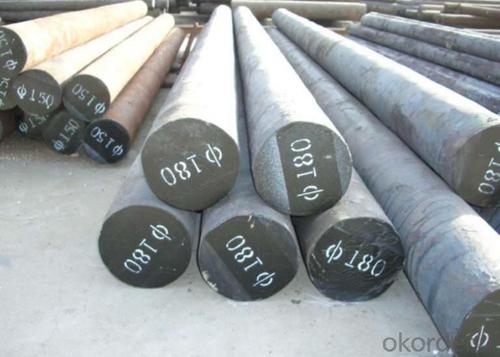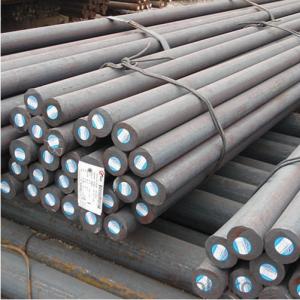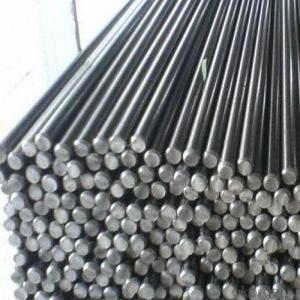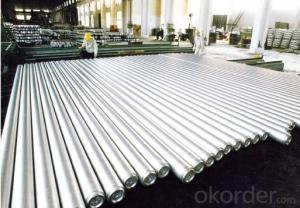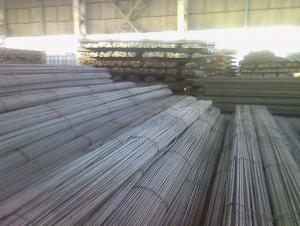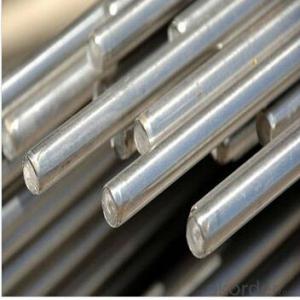Round Steel Spring Bar 60Si2MnA
- Loading Port:
- China Main Port
- Payment Terms:
- TT or LC
- Min Order Qty:
- 50MT m.t.
- Supply Capability:
- 600000TONS/YEAR m.t./month
OKorder Service Pledge
OKorder Financial Service
You Might Also Like
Spring Steel can be divided into two types. One is carbon spring steel, and other one is alloy spring steel.
Alloy spring steel is based on carbon spring steel, by adding one or more alloying elements to improve the mechanical properties, hardenability and other properties to meet the requirement for manufacturing all kinds of spring steel.
Specification of Round Steel Spring Bar:
-Material: 60Si2MnA
-Standard: GB
-Type: Spring Steel
Corresponding Steel Grade for Reference:
CHN, GB | JPN, JIS | GER, DIN | GBR, BS |
60Si2MnA | SUP6/SUP7 | 60SiCr7 | 251H60 |
FRA, NF | USA, AISI/SAE | ISO | |
61SC7 | H2600 | 61SiCr7 |
Chemical Composition:
C | Si | Mn | S |
0.52~0.6 | 1.50~2.00 | 1.00~1.30 | ≤0.035 |
P | Cr | Ni | Cu |
≤0.035 | ≤0.35 | ≤0.35 | ≤0.25 |
V | B | ||
0.08~0.16 | 0.0005~0.0035 |
Mechanical Properties:
-Tensile Strength σb (MPa): ≥1372 (140)
-Yield Strength σs (MPa): ≥1225 (125)
-Elongation δ10(%): ≥5
-Percentage reduction of area: ψ (%): ≥30
-Hardness:
1, Hot rolled, ≤321HB
2, Cold drawn + Heat treatment: ≤321HB
Usage/Applications of Round Steel Spring Bar:
-60Si2MnA contains little alloying elements. Its hardenability is higher than 60Si2Mn. The decarburizing tendency is small and the prime cost is low.
-Products of this material are used as flat spring o spiral spring with diameter less than 30mm that bear a large load during the fabrication of trains, cars and tractors.
Packaging & Delivery of Round Steel Spring Bar:
-Packing Detail: The products can be packed in bundles by steel wires.
-Delivery Detail:
1, Delivery time: 30~45 working days after receive buyer’s T.T. or L/C.
2, Delivery status should be written in the contract. (Heat treatment or no)
Payment:
-Invoicing on theoretical weight or actual weight as customer’s request.
-FOB, CFR or CIF.
-Regular terms of payment:
1, 30% payment in advance, the remaining balance (70% payment) against the copy of B/L. 100% payment before shipment.
2, 30% payment in advance, the remaining balance (70% L/C) against the copy of B/L. 100% payment before shipment.
3, Negotiable.
Photos of Round Steel Spring Bar:
-Round Steel Spring Bar 1:
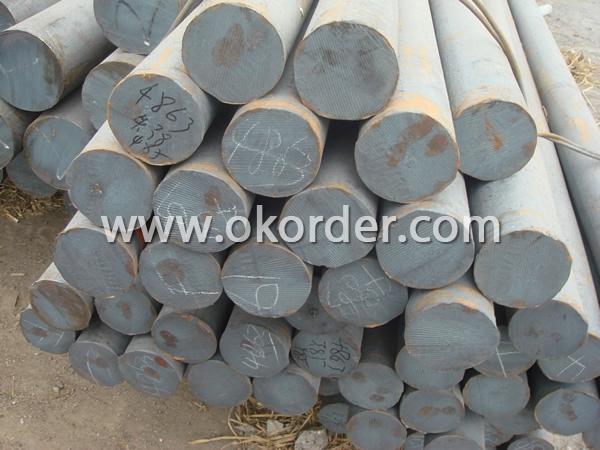
-Round Steel Spring Bar 2:
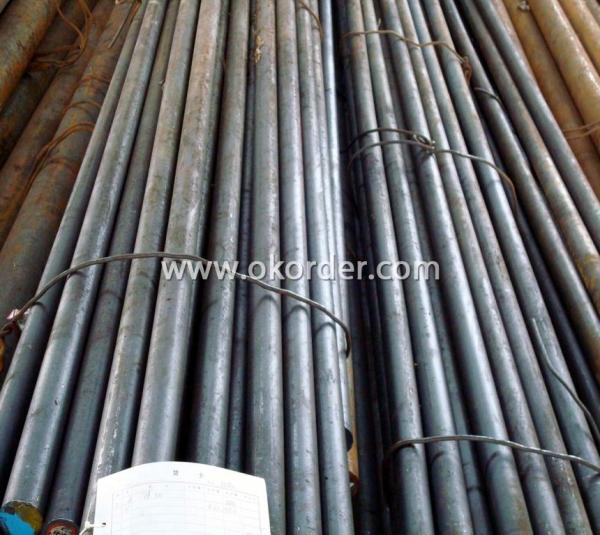
-Round Steel Spring Bar in the factory:
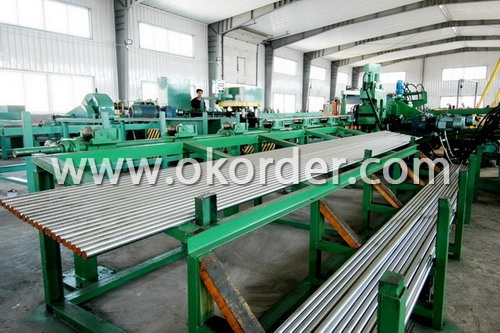
- Q: How is wear-resistant alloy steel used in the production of mining equipment?
- Wear-resistant alloy steel is commonly used in the production of mining equipment due to its exceptional durability and resistance to abrasion and impact. It is utilized in components such as crusher liners, grinding media, buckets, and drill bits to withstand the harsh conditions of mining operations, where rocks, ores, and minerals can cause significant wear and tear. By using wear-resistant alloy steel, mining equipment can operate for longer periods without the need for frequent replacements, resulting in improved productivity and reduced maintenance costs.
- Q: Can special steel be used in the construction industry?
- Yes, special steel can be used in the construction industry. Special steel, such as stainless steel or high-strength steel, offers various advantages including durability, corrosion resistance, and high strength-to-weight ratio. These qualities make it suitable for applications in building structures, bridges, reinforcement bars, and other construction components where strength and resistance to external elements are essential.
- Q: How does special steel contribute to the energy storage sector?
- Special steel plays a crucial role in the energy storage sector by providing essential components for various energy storage systems. One significant application of special steel is in the manufacturing of batteries, which are essential for storing energy in various forms. Special steel is ideal for battery casings and frames due to its high strength, excellent corrosion resistance, and durability. Battery casings made from special steel can withstand high pressures and protect the internal components from external impacts, ensuring the safety and reliability of the entire energy storage system. Furthermore, special steel is utilized in the production of electrodes, a critical component of batteries. Electrodes require materials that can efficiently conduct electricity while enduring repeated charge and discharge cycles. Special steel, such as stainless steel, possesses excellent electrical conductivity and can withstand the demanding conditions within batteries, making it an ideal choice for electrode manufacturing. Additionally, special steel is employed in the construction of infrastructure for energy storage systems. Steel structures are used to support large-scale energy storage devices like pumped hydro storage facilities and compressed air energy storage systems. These structures must be strong, durable, and resistant to environmental conditions. Special steel provides the necessary strength and corrosion resistance to ensure the longevity and reliability of these energy storage infrastructure projects. In summary, special steel contributes significantly to the energy storage sector by providing essential components for batteries, such as casings and electrodes. It also plays a vital role in the construction of infrastructure for energy storage systems. With its exceptional properties, special steel enhances the safety, efficiency, and durability of energy storage technologies, thereby facilitating the growth and advancement of the renewable energy sector as a whole.
- Q: How is special steel used in the production of cutting blades?
- Special steel is used in the production of cutting blades due to its exceptional properties, such as high hardness, toughness, and wear resistance. These properties allow the cutting blades to maintain their sharpness and durability even when subjected to intense cutting forces and repeated use. The special steel's composition and heat treatment processes ensure that the cutting blades are capable of withstanding harsh operational conditions, resulting in efficient and precise cutting performance across various industries, including manufacturing, construction, and agriculture.
- Q: How is creep-resistant steel used in the production of power plant components?
- Creep-resistant steel is used in the production of power plant components primarily due to its ability to withstand high temperatures and constant stress. These components, such as boilers, turbine blades, and heat exchangers, operate under extreme conditions and are exposed to elevated temperatures for prolonged periods. Creep-resistant steel, with its enhanced resistance to deformation and rupture at high temperatures, ensures the structural integrity and longevity of these power plant components, contributing to their reliable and efficient operation.
- Q: What are the different quenching techniques used for special steel?
- There are several quenching techniques used for special steel, including oil quenching, water quenching, polymer quenching, and air quenching. Each technique has its own advantages and disadvantages and is chosen based on the specific requirements of the steel being quenched. Oil quenching provides a slower cooling rate, resulting in reduced risk of cracking and distortion. Water quenching, on the other hand, provides a rapid cooling rate, making it suitable for achieving maximum hardness. Polymer quenching offers a controlled cooling rate, allowing for the desired balance between hardness and toughness. Air quenching is the slowest cooling method, providing the least hardness but also the least risk of distortion. The choice of quenching technique depends on the desired properties of the special steel and the specific application it will be used for.
- Q: Can special steel be used in the chemical processing equipment manufacturing industry?
- Yes, special steel can be used in the chemical processing equipment manufacturing industry. Special steel is often used in this industry due to its superior corrosion resistance, high temperature resistance, and excellent mechanical properties. It can withstand the harsh chemical environments and extreme operating conditions typically found in chemical processing equipment.
- Q: Can special steel be used in the plastic manufacturing industry?
- Yes, special steel can be used in the plastic manufacturing industry. It can be used for various purposes such as creating molds, dies, or tools needed for plastic injection molding or extrusion processes. Special steel's high strength, durability, and resistance to wear make it suitable for these applications, ensuring efficient and precise manufacturing of plastic products.
- Q: What are the main factors affecting the machinability of special steel?
- Several key factors influence the machinability of special steel, which refers to its ease of cutting, shaping, and forming. 1. The chemical composition of special steel plays a crucial role in its machinability. Elements like carbon, chromium, nickel, and molybdenum can significantly impact the material's hardness, toughness, and cutting properties. For instance, higher carbon content can increase steel's hardness, making it more difficult to machine. 2. The hardness of special steel is a critical factor in determining its machinability. Harder steels require more cutting force and generate more heat during machining, leading to increased tool wear and reduced efficiency. On the other hand, softer steels are generally easier to machine but may result in lower tool life. 3. The heat treatment process applied to special steel can greatly influence its machinability. Treatments like annealing, tempering, or quenching can alter the steel's microstructure and mechanical properties, affecting how it responds to cutting forces. Proper heat treatment can improve machinability by reducing hardness and increasing toughness. 4. The size and distribution of grains within the steel also impact its machinability. Fine-grained steel tends to have better machinability compared to coarse-grained steel, as smaller grains offer more uniform cutting conditions and reduce the risk of tool damage. 5. Machining parameters, including cutting speed and feed rate, directly affect the machinability of special steel. Higher cutting speeds can increase tool wear and generate excessive heat, affecting surface finish and dimensional accuracy. Similarly, incorrect feed rates can cause chip formation problems, resulting in poor machinability. 6. The choice of cutting tool material and geometry is crucial for achieving optimal machinability. Different tool materials, like carbide or high-speed steel, have varying wear resistance and cutting properties. The tool geometry, including rake angle and clearance angle, also affects chip formation, cutting forces, and heat generation. 7. Adequate lubrication and cooling during machining are essential to enhance machinability. Lubricants or coolants help reduce friction and heat, prolong tool life, and improve chip evacuation. Additionally, they prevent workpiece deformation and improve surface finish. Considering these factors, it is important to carefully select the appropriate special steel grade, optimize machining parameters, and use suitable cutting tools and lubrication to achieve the desired machinability and maximize productivity.
- Q: What are the different additive manufacturing grades of special steel?
- There are several different additive manufacturing grades of special steel that are specifically designed for use in 3D printing processes. These grades of special steel are formulated to provide enhanced mechanical properties, improved printability, and increased corrosion resistance. One common additive manufacturing grade of special steel is maraging steel. Maraging steel is a low-carbon, high-nickel alloy that exhibits excellent strength and toughness. It is often used in applications that require high-strength components, such as aerospace and defense industries. Another grade of special steel commonly used in additive manufacturing is stainless steel. Stainless steel is known for its high resistance to corrosion and its ability to maintain its strength at high temperatures. It is widely used in various industries, including automotive, medical, and consumer goods. Tool steel is another important grade of special steel used in additive manufacturing. Tool steel is known for its high hardness and wear resistance, making it ideal for applications that require cutting, shaping, or forming materials. It is commonly used in the production of molds, dies, and tooling components. Inconel is a superalloy grade of special steel that is often used in additive manufacturing for its high-temperature strength and excellent oxidation resistance. It is commonly utilized in aerospace, automotive, and chemical processing industries. Overall, the different additive manufacturing grades of special steel offer a wide range of properties and applications. These materials are constantly being developed and improved to meet the growing demands of the additive manufacturing industry.
1. Manufacturer Overview
| Location | Jiangsu, China |
| Year Established | 2003 |
| Annual Output Value | Above US$ 30 Million |
| Main Markets | Asia-Pacific; Middle east |
| Company Certifications |
2. Manufacturer Certificates
| a) Certification Name | |
| Range | |
| Reference | |
| Validity Period |
3. Manufacturer Capability
| a) Trade Capacity | |
| Nearest Port | Shanghai. |
| Export Percentage | 20% - 30% |
| No.of Employees in Trade Department | 10-20 People |
| Language Spoken: | English; Chinese |
| b) Factory Information | |
| Factory Size: | Above 100,000 square meters |
| No. of Production Lines | 2 |
| Contract Manufacturing | OEM Service Offered; |
| Product Price Range | Average |
Send your message to us
Round Steel Spring Bar 60Si2MnA
- Loading Port:
- China Main Port
- Payment Terms:
- TT or LC
- Min Order Qty:
- 50MT m.t.
- Supply Capability:
- 600000TONS/YEAR m.t./month
OKorder Service Pledge
OKorder Financial Service
Similar products
Hot products
Hot Searches
Related keywords

